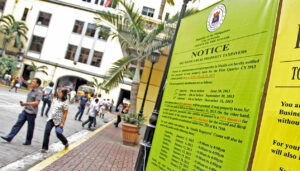CITIES with outdated schedules of market values (SMVs) for real property have been estimated at 65%, or 96 out of 146, the Congressional Policy and Budget Research Department (CPBRD) said.
SMVs are the basis for calculating property tax, and an outdated schedule with artificially low valuations means local government units are collecting below their potential.
“The number of overdue revisions in SMVs, correlated significantly and negatively with the RPT (real property tax) collections,” the CPBRD said in a report.
According to the report real property tax collections by cities grew only 5.3% between 2019 and 2021, lagging the cities’ rate of development. It added that the Philippines’ recurring taxes on immovable property as a percentage of total tax revenue averaged 2.1%, against Singapore’s 6.7%.
The National Capital Region (NCR) generated P31.18 billion or 39.9% of all real property taxes in 2021, leading all the regions. The City of Manila collected P5.4 billion in real property tax, the most of any local government in the NCR.
House legislators in December approved on third and final reading House Bill No. 6558 or the Real Property Valuation Assessment and Reform Act.
The bill proposes to require the updating of SMVs within two years after the measure passes, and to strengthen the Bureau of Local Government Finance (BLGF) to support the government’s tax reform agenda.
It also proposed that the valuation or appraisal of all real property whether taxable or tax-exempt be based on prevailing market values. Local governments not revising their SMVs will be subject to penalty.
Its counterpart measure, Senate Bill No. 314, is pending at the committee level.
The BLGF estimated that the measure’s passage would generate incremental revenue of between P18.6 billion and P37.5 billion.
Finance Undersecretary Maria Cielo D. Magno told a March 9 Senate hearing that local governments should have a regularly updated database of property transactions for reference in setting property valuations. — Beatriz Marie D. Cruz
